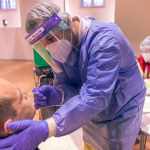Despite global vaccination efforts[1], the COVID-19 pandemic remains a public health emergency of international concern.[2] Globally, there have been almost 200 million confirmed cases of SARS-CoV-2. Over four million people have passed away due to COVID-19.
Getting tested for COVID-19 is essential for anyone displaying symptoms, as well as those that might have come into contact with the virus.[3] Today, we look at why testing for COVID-19 is crucial and when you should get tested.
Table of Contents
Why Testing Is Important
There are two important reasons why people need to ensure they get tested in certain situations[4]. First, testing allows the individual to become aware of an active Covid-19 infection[5]. By getting tested, people are also helping to prevent and reduce the spreading of COVID-19.[6]
The COVID-19 testing data[7] [8] can be used to track and contain the spread of the pandemic. It also supports the implementation and update of national and local response plans against COVID-19 and its variants.[9]
When You Should Get Tested
There are several cases where a person would qualify for a COVID-19 test[10]. The most obvious reason to get tested is when the person is showing symptoms of COVID-19, including coughing, body aches, fatigue, shortness of breath, and fever. In this case, a PT-PCR laboratory test can confirm whether the person has been infected with the virus[11]. [12]
In addition to these reasons, it is also advisable to get tested if you have been possibly exposed to the virus. This accounts for individuals who recently interacted with someone who has been confirmed to be positive. The individual should ensure they get tested even if they are asymptomatic. [13]
Three types of tests are available, including:
● PCR, also known as a molecular test.
● Antigen tests, which identify proteins that are found on the virus’s surface.
● Antibody tests are used to measure an individual’s antibody response to a COVID-19 infection or vaccination.
How To Get Tested
COVID-19 tests are readily available at most health centers[14][15], making it easier for a person to get tested for COVID-19. Antigen and molecular tests involve collecting a mucus sample at the back of the throat. Mucus may also be collected from the nose.[16] A cotton swab is used in the process.[17]
It is generally advisable for a patient to get in touch with their healthcare provider[18]. This should be done if symptoms are displayed or if the person was recently exposed to someone with COVID-19.
The healthcare provider may advise the patient where they can carry out the test. Some tests, such as Rapid Diagnostic Tests,[19] can provide fast results, while others require a sample to be submitted to a laboratory.
It is important to understand that a sample tested at a lab will take longer before a result is available. In most cases, patients can know whether or not they have COVID-19 within 48 hours[20].
Conclusion
The COVID-19 pandemic has disrupted the lives of people around the world[21]. Getting tested is an important method to help reduce the spread of the virus, as this allows infected individuals to isolate themselves.
When researching the topic, we came across Wondfo Biotech. Since the start of the pandemic, Wondfo has been on the front line to develop testing solutions for COVID-19. Their wide range of products includes PCR, antigen, and antibodies tests.
Check the Wondfo website for more information on this company and its reliable COVID-19 testing solutions.
References
https://www.mayoclinic.org/tests-procedures/covid-19-diagnostic-test/about/pac-20488900
https://healthitanalytics.com/news/data-analytics-tool-helps-design-covid-19-testing-strategies
https://www.cdc.gov/coronavirus/2019-ncov/symptoms-testing/symptoms.html
- https://www.news-medical.net/news/20210420/Despite-global-efforts-allocation-and-distribution-of-COVID-19-vaccines-are-not-equitable.aspx ↑
- https://www.who.int/news/item/15-07-2021-statement-on-the-eighth-meeting-of-the-international-health-regulations-(2005)-emergency-committee-regarding-the-coronavirus-disease-(covid-19)-pandemic ↑
- https://www.cdc.gov/coronavirus/2019-ncov/symptoms-testing/testing.html ↑
- https://www.nia.nih.gov/news/why-covid-19-testing-key-getting-back-normal ↑
- https://www.health.harvard.edu/diseases-and-conditions/if-youve-been-exposed-to-the-coronavirus ↑
- https://www.nia.nih.gov/news/why-covid-19-testing-key-getting-back-normal ↑
- https://www.clemson.edu/covid-19/testing/research-data.html ↑
- https://www.hhs.gov/coronavirus/testing/covid-19-diagnostic-data-reporting/index.html ↑
- https://www.whitehouse.gov/wp-content/uploads/2021/01/National-Strategy-for-the-COVID-19-Response-and-Pandemic-Preparedness.pdf ↑
- https://ourworldindata.org/coronavirus-testing ↑
- https://www.labtestsonline.org.au/learning/index-of-conditions/covid-19/learn-more-about-covid-19 ↑
- https://www.fda.gov/consumers/consumer-updates/coronavirus-disease-2019-testing-basics ↑
- https://www.cdc.gov/coronavirus/2019-ncov/symptoms-testing/testing.html ↑
- https://www.hhs.gov/coronavirus/community-based-testing-sites/index.html ↑
- https://apps.who.int/iris/bitstream/handle/10665/272465/9789241513906-eng.pdf?ua=1 ↑
- https://www.sciencedaily.com/releases/2020/07/200724141023.htm ↑
- https://health.ucdavis.edu/coronavirus/coronavirus-testing.html ↑
- http://www.globalhealthprimer.emory.edu/targets-technologies/rapid-diagnostic-test.html ↑
- https://www.health.harvard.edu/diseases-and-conditions/if-youve-been-exposed-to-the-coronavirus ↑
- https://www.nie.edu.sg/teacher-education/useful-resources-for-HBL-WFH-EdCo/education-related-covid-19-articles ↑







